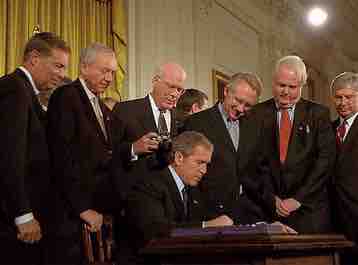Background of the PATRIOT Act
The Uniting and Strengthening America by Providing Appropriate Tools Required to Intercept and Obstruct Terrorism Act (USA PATRIOT Act), also commonly known as the Patriot Act, is an Act of the U.S. Congress that was signed into law by President George W. Bush on October 26, 2001. The Patriot Act came as a response to the terrorist attacks of September 11th and included:

Patriot Act Signing
President George W. Bush signs the Uniting and Strengthening America by Providing Appropriate Tools Required to Intercept and Obstruct Terrorism (USA PATRIOT) Act, Anti-Terrorism Legislation, in the East Room Oct. 26. "With my signature, this law will give intelligence and law enforcement officials important new tools to fight a present danger," the President said in his remarks.
- A significant reduction of restrictions to law enforcement agencies' gathering of intelligence within the United States
- An expansion of the Secretary of the Treasury's authority to regulate financial transactions, particularly those involving foreign individuals and entities
- A broadening of the discretion allowed to law enforcement and immigration authorities in detaining and deporting immigrants suspected of terrorism-related acts.
The act also expanded the definition of terrorism to include domestic terrorism, thus enlarging the number of activities to which the USA PATRIOT Act's expanded law enforcement powers can be applied. On May 26, 2011, President Barack Obama used an Autopen to sign a four-year extension of three key provisions in the USA PATRIOT Act: roving wiretaps, searches of business records (the library records provision), and conducting surveillance of lone wolves-- individuals suspected of terrorist-related activities not linked to terrorist groups. Republican leaders questioned whether the use of the Autopen met the constitutional requirements for signing a bill into law.
Due to its controversial nature, a number of bills were proposed to amend the USA PATRIOT Act. These included the Protecting the Rights of Individuals Act, the Benjamin Franklin True Patriot Act, and the Security and Freedom Ensured Act (SAFE), none of which passed. In late January 2003, the founder of the Center for Public Integrity, Charles Lewis, published a leaked draft copy of an Administration proposal titled the Domestic Security Enhancement Act of 2003. This highly controversial document was quickly dubbed "PATRIOT II" or "Son of PATRIOT" by the media and organizations such as the Electronic Frontier Foundation. The draft, which was circulated to ten divisions of the Department of Justice, proposed to make further extensive modifications to extend the USA PATRIOT Act. It was widely condemned, although the Department of Justice claimed that it was only a draft and contained no further proposals.
Controversy
The USA PATRIOT Act has generated a great deal of controversy since its enactment. Opponents of the Act have been quite vocal in asserting that it was passed opportunistically after the September 11 attacks. Opponents view the Act as one that was hurried through the Senate with little change or debate before it was passed. Senators Patrick Leahy and Russell Feingold proposed amendments to modify the final revision.
It was placed there without a warrant, which caused a serious conviction obstacle for federal prosecutors in court. Through the years the case has risen to the United States Supreme Court where the conviction was overturned in favor of the defendant. The court found that increased monitoring of suspects caused by such legislation like the Patriot Act directly put the suspects Constitutional rights in jeopardy.
The USA PATRIOT Act's expansion of court jurisdiction to allow the nationwide service of search warrants proved controversial for the Electronic Frontiers Foundation (EFF). They believe that agencies will be able to shop for judges that have demonstrated a strong bias toward law enforcement with regard to search warrants, and use only those judges least likely to say no even if the warrant doesn't satisfy the strict requirements of the Fourth Amendment to the Constitution. They also believe that the expansion reduces the likelihood that smaller ISPs or phone companies will try to protect the privacy of their clients by challenging the warrant in court; for example a small San Francisco ISP served with such a warrant may be unlikely to have the resources to appear before the New York court that issued it. They also assert that only the communications provider will be able to challenge the warrant as only they will know about it; many warrants are issued ex parte, which means that the target of the order is not present when the order is issued.
For a time, the USA PATRIOT Act allowed for agents to undertake "sneak and peek" searches. Critics such as the Electronic Privacy Information Center (EPIC) and the American Civil Liberties Union (ACLU) strongly criticized the law for violating the Fourth Amendment, with the ACLU going so far as to release an advertisement condemning it and calling for it to be repealed. However, supporters of the amendment such as Heather Mac Donald, a fellow at the Manhattan Institute and a contributing editor to the New York City Journal, expressed the belief that the act was necessary because the temporary delay in notification of a search order could stop terrorists from tipping off counterparts under investigation.
The USA Freedom Act
The USA FREEDOM Act ("Uniting and Strengthening America by Fulfilling Rights and Ending Eavesdropping, Dragnet-collection and Online Monitoring Act"), more commonly known as the Freedom Act, is a U.S. law that was enacted on June 2, 2015, the day after the PATRIOT Act expired. The Freedom Act modified several provisions of the Patriot Act and limited the ability of American intelligence agencies, such as the NSA, to bulk-collect telecommunications data on US citizens. It restored authorization for roving wiretaps and tracking "lone wolf" terrorists.